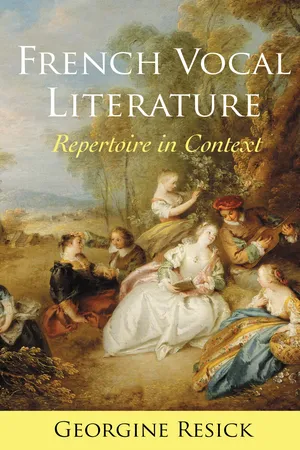
- 343 pages
- English
- PDF
- Available on iOS & Android
eBook - PDF
About this book
French Vocal Literature: Repertoire in Context introduces singers to the history and performance concerns of a vast body of French songs from the twelfth century to the present, focusing on works for solo voice or small vocal ensembles with piano or organ accompaniment, suitable for recitals, concerts, and church performances. Georgine Resick presents vocal repertoire within the context of trends and movements of other artistic disciplines, such as poetry, literature, dance, painting, and decorative arts, as well as political and social currents pertinent to musical evolution. Developments in French style and genre—and comparisons among individual composers and national styles—are traced through a network of musical influence.
French Vocal Literature is ideally suited for voice teachers and coaches as well as student and professional performers. The companion website, frenchvocalliterature.com, provides publication information, a discography, links to online recordings and scores, a chronology of events pertinent to music, a genealogy of royal dynasties, and a list of governmental regimes.
French Vocal Literature is ideally suited for voice teachers and coaches as well as student and professional performers. The companion website, frenchvocalliterature.com, provides publication information, a discography, links to online recordings and scores, a chronology of events pertinent to music, a genealogy of royal dynasties, and a list of governmental regimes.
Frequently asked questions
Yes, you can cancel anytime from the Subscription tab in your account settings on the Perlego website. Your subscription will stay active until the end of your current billing period. Learn how to cancel your subscription.
No, books cannot be downloaded as external files, such as PDFs, for use outside of Perlego. However, you can download books within the Perlego app for offline reading on mobile or tablet. Learn more here.
Perlego offers two plans: Essential and Complete
- Essential is ideal for learners and professionals who enjoy exploring a wide range of subjects. Access the Essential Library with 800,000+ trusted titles and best-sellers across business, personal growth, and the humanities. Includes unlimited reading time and Standard Read Aloud voice.
- Complete: Perfect for advanced learners and researchers needing full, unrestricted access. Unlock 1.4M+ books across hundreds of subjects, including academic and specialized titles. The Complete Plan also includes advanced features like Premium Read Aloud and Research Assistant.
We are an online textbook subscription service, where you can get access to an entire online library for less than the price of a single book per month. With over 1 million books across 1000+ topics, we’ve got you covered! Learn more here.
Look out for the read-aloud symbol on your next book to see if you can listen to it. The read-aloud tool reads text aloud for you, highlighting the text as it is being read. You can pause it, speed it up and slow it down. Learn more here.
Yes! You can use the Perlego app on both iOS or Android devices to read anytime, anywhere — even offline. Perfect for commutes or when you’re on the go.
Please note we cannot support devices running on iOS 13 and Android 7 or earlier. Learn more about using the app.
Please note we cannot support devices running on iOS 13 and Android 7 or earlier. Learn more about using the app.
Yes, you can access French Vocal Literature by Georgine Resick in PDF and/or ePUB format, as well as other popular books in Media & Performing Arts & Music. We have over one million books available in our catalogue for you to explore.
Information
Table of contents
- Contents
- Acknowledgments
- Musical Abbreviations
- Introduction
- Prologue French Prosody
- 1 French Poetry and the Development of Vocal Forms (Twelfth to Sixteenth Centuries)
- •2 The Turbulent Century and the air de cour (1576–1661) Pierre Guédron, Gabriel Bataille, Antoine Boësset, Etienne Moulinié
- 3 The Grand Siècle: Louis XIV and the Birth of French Opera (1661–1715) Sébastien Le Camus, Michel Lambert, Bertrand de Bacilly, Jean-Baptiste Lully, Marc-Antoine Charpentier
- 4 Life after Lully (1697–1750) André Campra, François Couperin, Michel-Richard de LaLande, Jean-Joseph Cassanéade Mondonville, Nicolas Bernier, Michel Pignolet de Montéclair, Louis-Nicolas Clérambault, Élisabeth Jacquet de la Guerre, Jean-Philippe Rameau
- Entr’acte: Enlightenment, Revolution, and Empire (1750–1815) Jean-Paul Martini, Christoph Willibald von Gluck, François-Joseph Gossec, André-Ernest-Modeste Grétry, Pierre-Alexandre Monsigny, Étienne-Nicolas Méhul, Jean-François Le Sueur, Luigi Cherubini
- 5 Romance to Mélodie: The Advent of Romanticism in France (1815–1848) Jean-Paul Martini, Adrien Boieldieu, PaulineDuchambge, Loïsa Puget, Hippolyte Monpou, Félicien David, Henri Romagnesi, Pauline Viardot, Gioacchino Rossini, Giacomo Meyerbeer, Louis Niedermeyer, Hector Berlioz, Franz Liszt, Richard Wagner
- 6 Middle-Class Mélodie (1848–1870) Charles Gounod, Georges Bizet, Jules Massenet
- 7 The Mélodie as Chamber Musi (1870–1880) Camille Saint-Saëns, Édouard Lalo, Gabriel Fauré
- 8 Wagnerites and Acolytes (1880s–1890s) César Franck, Ernest Chausson, Henri Duparc, Vincent d’Indy
- 9 The Belle Époque I (1885–1894) Emmanuel Chabrier, Erik Satie, Reynaldo Hahn
- 10 Harmonic and Prosodic Rebels: The “Impressionists” (The Belle Époque II: 1894–1906) Claude Debussy, Maurice Ravel
- 11 “True France” and the March to War (The Belle Époque III: 1906–1914) Late Gabriel Fauré, Nadia Boulanger, Charles Koechlin, André Caplet, Albert Roussel, Jacques Ibert
- 12 Les Années folles: Cocteau, Satie, and Les Six (1918–1930) Germaine Tailleferre, Louis Durey, Georges Auric, Arthur Honegger, Darius Milhaud, Francis Poulenc
- 13 The Mystical Mélodie and Neoromanticism (1914–1945) Lili Boulanger, Jean Cras, Olivier Messiaen, André Jolivet, Late Francis Poulenc
- 14 Into the Twenty-First Century: Connecting the Irreconcilable (1945–Present) Edgard Varèse, Pierre Schaeffer, Pierre Boulez, Jean Barraqué, Betsy Jolas, Paul Méfano, Iannis Xenakis, Maurice Ohana, Henri Dutilleux, Georges Aperghis, Pascal Dusapin, Philippe Leroux, Michel Decoust, Isabelle Aboulker
- Glossary
- Bibliography
- Index
- About the Author